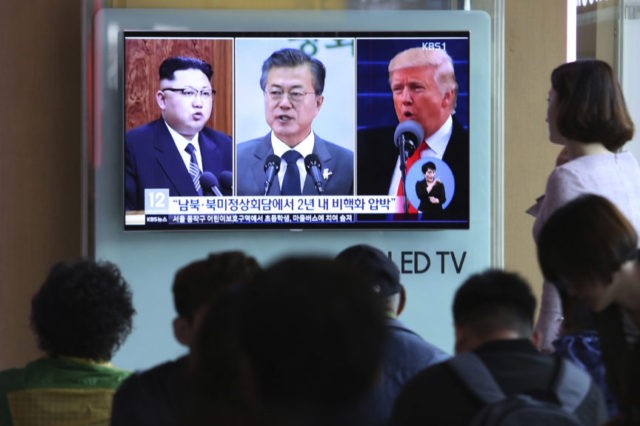Multiple South Korean newspapers reported on Monday that North and South Korea seek to declare an official end to the Korean War, perhaps as soon as on the date of the scheduled summit between U.S. President Donald Trump and North Korean communist dictator Kim Jong-un, June 12.
A senior South Korean official told reporters that the process of denuclearizing the Korean peninsula would begin with the official end to the Korean War, which remains ongoing. The war began in 1950, and open conflict ended with the signing of an armistice agreement in 1953. Neither side surrendered the war, nor did either side sign any peace agreement to officially end it, leaving it in a state of ongoing stalemate for the past 68 years. The war killed approximately four million people, most Korean.
“Discussions over an end to the war will be a starting point for setting up a permanent peace regime (on the peninsula),” Choo Mi-ae, the chairwoman of South Korea’s ruling Democratic Party (DP), told reporters Monday, according to the Korea Herald. “The DP will support a successful US-North Korea summit and do its part to establish peace on the peninsula through the declaration of the war’s end and a peace treaty.”
An unnamed “diplomatic source” told another South Korean newspaper, the JoongAng Ilbo, that leftist South Korean President Moon Jae-in was seeking to be part of an official announcement of a peace treaty in the Korean War with Kim and Trump in Singapore. Reports in May suggested that Moon was trying to find a way to invite himself to the Singapore summit.
“Preparations are already underway for President Moon to declare a formal end to the Korean War with the two leaders on June 12, the date of the North-U.S. summit, or the next day on the 13th,” the unnamed official told JoongAng Ilbo. “Singapore has already begun preparations to host President Moon [for a trilateral meeting].”
The newspaper notes that a South Korean official traveled to Singapore last week, “fueling speculation that the aide might be preparing for a meeting involving Moon, Kim and Trump” but that Seoul denied any such preparation was taking place. Moon’s official previously told reporters, however, that Moon was interested in that summit.
Chosun Ilbo, a conservative South Korean newspaper, quoted a South Korean official Monday explicitly denying that Moon was categorically invited to the June 12 Trump-Kim meeting. “Nothing has been decided yet about a trip to Singapore or a trilateral summit,” the unnamed official told Chosun. The newspaper, nonetheless, concluded that “chances are growing that the U.S., South and North Korea will begin discussing a peace treaty formally ending the Korean War over six decades since fighting stopped.”
On April 27, when Kim and Moon first met, the two signed a document called the Panmunjom Declaration, which stated that both sides agreed that “there will be no more war on the Korean Peninsula and thus a new era of peace has begun.” Yet, as the Korean War was largely fought between China and the United States – and both are signatories to the ceasefire agreement that ended open hostility – North and South Korea cannot end the Korean War without Washington and Beijing signing on to any peace treaty.
North Korean state media – the only legal outlets in North Korea, and widely interpreted as representing the opinions of Kim and his highest-ranking officials in Pyongyang – have repeatedly touted the Panmunjom Declaration as the will of all the Korean people and excitedly written of the possibility of an end to the war.
“The adoption of the declaration is a demonstration of strong aspiration and will to end the tragic history of the Korean nation woven with division and confrontation and usher in a new era of peace, prosperity and reunification,” Rodong Sinmun, the state newspaper, declared in a column Monday.
President Trump told reporters on Friday, following a meeting with North Korean terrorist and senior official Kim Yong-chol, that the two discussed the possibility of ending the Korean War.
“Can you believe that we’re talking about the ending of the Korean War?” Trump asked reporters. “You’re talking about 70 years.”
Ending the war would create two immediate international problems to solve: the rebuilding of the destitute North Korean economy, ravaged by nearly a century of communism, and what to do about the 28,000 American soldiers stationed on the Korean border, the Demilitarized Zone (DMZ). President Trump has dismissed the possibility that the United States would invest heavily in the estimated two to five trillion dollars it would take to bring North Korea back into the international community, leaving South Korea, China, and Japan to foot much of that bill. Chinese and South Korean officials have pressured Washington to reconsider.
On the border, America has stationed soldiers there since the war began, and they remain there protecting the border because the war never ended. Ending the war would raise the possibility of leaving South Korea to protect itself from a North Korean invasion by itself.
“We’re not going anywhere. It’s not even a subject of the discussions,” Secretary of Defense Jim Mattis told reporters about the potential removal of American soldiers on Monday. “Five years from now, ten years from now, it could be up for review [but] that would be between a democracy called the Republic of Korea and a democracy called the United States of America.”

COMMENTS
Please let us know if you're having issues with commenting.